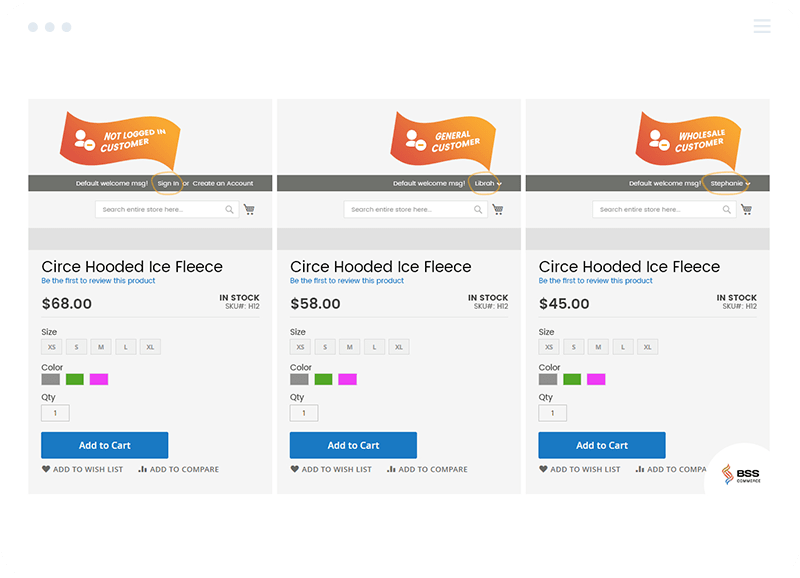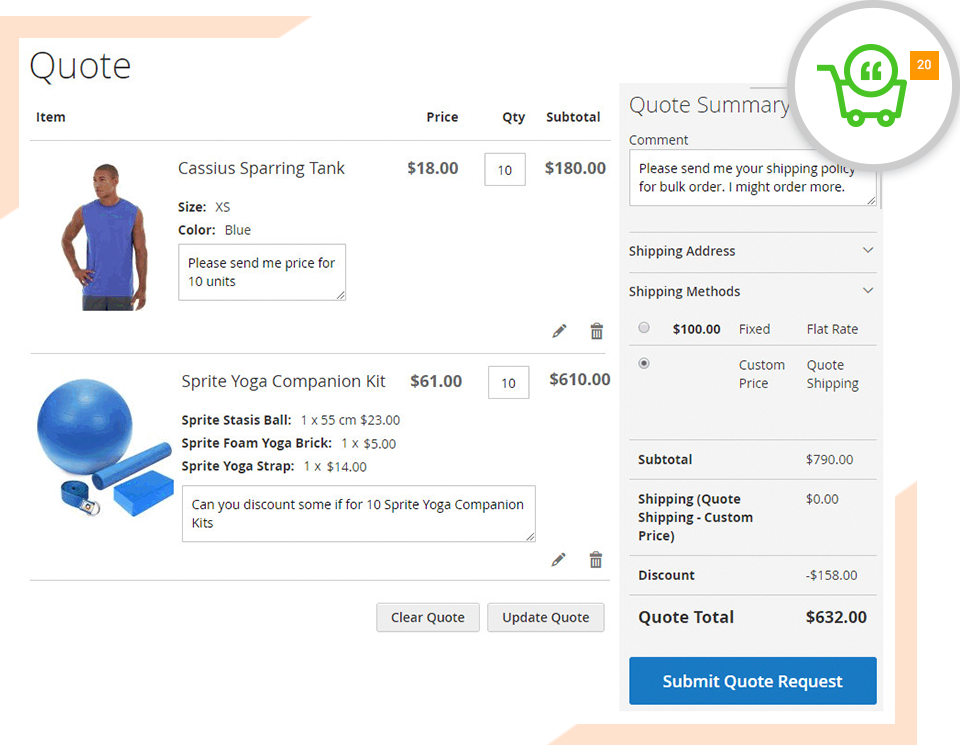No matter what business model you’re functioning in, B2B pricing is always the top concern of businesses. Each customer group has different affordability with large and small demand depending on their selling plan. In this case, a custom pricing strategy begins to take effect.
Let us walk you through the most concise knowledge about Magento 2 B2B customize pricing in particular and the eCommerce market in general. From there, you can take advantage of tools in building the most effective pricing strategies to stay competitive in this fierce marketplace.
First Approach to B2B Custom Pricing
Table of Contents

Our first section will cover customize pricing concepts to give you a critical overview of this topic.
About B2B Pricing
It isn’t a solitary object but a process involving a lot of analysis of customer behavior and tastes. B2B pricing ranges from the setting stage to the communication of prices to commercial organizations through many methods such as marketing and negotiation. The ultimate goal is persuading wholesale customers to use your products/ services.  The explosion of information technology and online B2B is simultaneously an opportunity and a challenge for businesses in launching their sales campaigns.
The explosion of information technology and online B2B is simultaneously an opportunity and a challenge for businesses in launching their sales campaigns.
On one hand, the exchange between two companies becomes more comfortable and faster with the assistance of pricing tools. On the other hand, an ingenious pricing strategy can ruin customer trust and loyalty, because now it’s very easy for Internet users to access information related to price policy.
So move to the next part to see what you should do with your B2B pricing strategy.
SAVE Magento B2B pricing for LATER REFERENCE to comprehend 4 wholesale pricing strategies.
Consider These Things to Hone Your Magento 2 Pricing Strategy
Pay Attention to Product Types’ Price Sensitivity
Typically, the B2B product line includes different product types from low-end to high-end to target many customer segments in the market. As a result, the price sensitivity will vary depending on the type of product.
This is a favorable condition you can rely on for custom pricing. Let’s assume you have 3 product types, including high-end, commodity, and customized. The commodity is often much more price-sensitive than its counterparts. So, this difference should be reflected in your pricing strategy.
Don’t forget to divide the category carefully based on the demand elasticity for customized pricing.
Stick to B2B Buyer Personas
Working with humans is quite tricky. Especially when it comes to organization, your B2B clients will go a long way to reach their final purchase decision.  Along the way, they are influenced by countless factors such as colleagues, seasons, budget, and others. Furthermore, B2B customers are more price-sensitive than B2C ones. Due to running a whole business, they must brainstorm how to distribute cash flow in the most optimal and economical way.
Along the way, they are influenced by countless factors such as colleagues, seasons, budget, and others. Furthermore, B2B customers are more price-sensitive than B2C ones. Due to running a whole business, they must brainstorm how to distribute cash flow in the most optimal and economical way.
Moreover, different audiences have different perceptions of brand value. For example, customers who care about product quality and customer services are less price-sensitive than those who don’t pay much attention to these factors.
Thus, it’s imperative for companies to supply products at prices that stick to buyer personas. If you fail in pricing, chances are you’ll fall behind in the B2B eCommerce race. An incomplete buyer persona will make it difficult for you to depict your potential customers, what they demand, and at which price points they’re willing to pay.
In this case, a best practice is developing personas for pricing purposes, which takes feature taste and willingness to pay into account. This will allow you to sharpen customize pricing strategies that appeal to many more customer groups.
Harmonize Logic & Emotional Decision
We can’t deny that B2B clients use more rationality to purchase than their counterparts do. However, logical buying behavior only increases with the size of that store. That means starters (aka innovators and early adopters) in the B2B industry will often let emotion dominate their purchasing decisions.
Compared with seniors, companies at this early stage don’t have actual data and experience, so they will partially rely on their feelings to plan purchases to gain a competitive edge quickly.
Utterly opposed to new ones, B2B corporations that have a firm foothold will not put emotions into doing business with you. At this time, their willingness to pay also goes down.
Nevertheless, the most crowded customer group in your market share lies in the middle, where buyers put both their minds and emotions into the buying decision. At this point, you must customize B2B pricing according to the economic drivers specific to their niche. Your pricing policy must support its own pricing metrics and value models.
ABSORB Best B2B Marketing Strategies to deploy innovative campaigns for your business.
Experiment with Your Pricing
Even after having implemented a pricing strategy for corporate customers, you should constantly test and reevaluate that strategy. This habit will allow you to see changes in customers’ responses to your personalized pricing so that you can adjust prices more appropriately.
For example, you can leverage A/B testing to test the effectiveness of each aspect in a marketing strategy. Based on that, your company can launch an optimal combination of products and price points that appeal to many more clients.
Differentiate Dynamic vs Customized Pricing
These two pricing methods have gained much attention in B2B business thanks to their flexibility. Sometimes, you may use these terms interchangeably; however, they are not exactly the same. 
Dynamic Pricing
As its name has implied, dynamic pricing is a pricing strategy when prices change flexibly based on variables that are not related to the customer. For instance, variables include a specific time of day, the weather, the inventory and the competitor’s prices.
If this pricing method is applied, everyone sees the same price, no matter who the customer is. The seller modifies its price to match the market and capture more customer demand. Pros:
- You can freely choose what factors will affect your price changes. Amazon’s success with dynamic pricing has proven that this pricing technique is crucial in the e-Commerce world to foster margin growth and profits.
- Depending on the market fluctuation, sellers can competitively raise or lower prices. For example, United, Delta, American and Southwest airlines all utilize dynamic pricing to determine variables such as travel costs based on peak seasons and seat prices based on availability.
Cons:
- The monitoring process is complicated because you have to stay updated all the time to set up effective product prices.
- You may face the “black box problem”. It means when the company’s pricing members don’t get the logic behind the mathematical algorithm of dynamic pricing, so they refuse the price recommended by the system. Your company will have to overcome this trust barrier.
Customize Pricing
As opposed to dynamic pricing’s purpose, that of customizing pricing is the merchants know who their customers are and incentivizes them with preferential price points based on their characteristics.
The idea behind custom pricing is that the closer the relationship between the seller and buyer is, the better the price will be. This pricing technique offers unique deals to loyal customers such as wholesalers and distributors. For example, visiting a product page, the non-logged-in will see a price tag of $5, while wholesalers see it as $3.
Pros:
- Different prices for the same product allow sellers to be profitable;
- Price per customer technique both ensures higher customer satisfaction and personalizes the shopping experience by using customer-level data.
Cons:
- Sellers have to develop a legal/ethical rationale on how to tailor different prices to different customers;
- Buyers may not like the fact that others are getting better deals than them;
- Customizing a price for a specific person requires detailed market research, which may be expensive and time-consuming.
Reasons Magento 2 B2B Companies Need Custom Price
It’s undeniable that B2B custom pricing is a relatively complicated process. Magento platform is no exception.
Magento 2 wholesale enterprises must estimate how to offset costs related to manufacturing, marketing, distribution, and sales. Not only do you have to set price points that can inflate brand awareness in the marketplace, but the pricing policy must be worthy of customer loyalty, and competitive enough with your competitors.
As a result, to maximize profits and retain corporate customers to purchase products/services, businesses are forced to analyze and decide on the right pricing strategy.
Packaging design or marketing tricks can draw customers’ attention to the product at first sight; however, price is still one of the critical factors in determining whether customers buy or not. Selling price is how manufacturers communicate with customers about product quality.
Ironically, too-low prices will raise doubts for consumers about product quality; while too-high prices cause products to lose their competitiveness.
Distinguish B2B & B2C Marketing
When it comes to the eCommerce world, the marketing game totally changes between B2B and B2C businesses. We all know that B2B transactions are done by 2 companies that don’t directly consume products/ services. Meanwhile, B2C is individual-driven where products sold to end-users.
For that reason, BB marketers confront many challenges since the target market keeps reshaping and adopting new competitors. Thus, more and more Magento 2 stores gauge the customize pricing technique to remain outstanding.
Depending on customer loyalty and relationships, you can define different prices of the same products for different customer groups. Marketers can bring incentivized product prices forward to target customers precisely.
Read more: 3 Key Differences Between B2B VS B2C Marketing In 2020
Personalize B2B Customer Experience
For those providing products to various customer groups, B2B customize pricing is a must-have to help your Magento store stay competitive.  Wholesalers will be disgraced when knowing that they are paying as much as an individual customer. Some inquiries like: “Why do I buy a great volume of goods for them but still have to pay the same?”; “The company doesn’t treat us well enough compared to the profit we bring to them, do they?”; “So unfair of the price!”,… may arise in your B2B customers’ mind. It will kill customer attachment to your business in the long term.
Wholesalers will be disgraced when knowing that they are paying as much as an individual customer. Some inquiries like: “Why do I buy a great volume of goods for them but still have to pay the same?”; “The company doesn’t treat us well enough compared to the profit we bring to them, do they?”; “So unfair of the price!”,… may arise in your B2B customers’ mind. It will kill customer attachment to your business in the long term.
By introducing a smart customize pricing strategy, you not only serve customers the best based on their financial status, logistical and geographic preferences but also provide them with valuable details. They can feel that they are gaining a real bargain from you and insist on doing transactions with your business.
Collect Valuable Data from Customers
Another reason why Magento store owners prefer using price per customer is its ability to collect more customer data. You know, customer data is a precious asset that determines the success of any company because it helps you go in-depth into customer behaviors and buying patterns.
There’s no way a visitor is willing to share with you their information unless you give them an incentive. Only when they know that you offer a better price point for the registers, for example, do they consider becoming your partner.
In other words, B2B custom pricing encourages passers-by to leave their information as a condition to buy products at beneficial prices. Thanks to that, you can gain a reservoir of corporate customer data to serve future marketing and sales campaigns.
Reinforce Your B2B Website with Useful Magento B2B Pricing Extensions
It is no coincidence that Magento EE includes customized pricing in their shared catalog feature. Although they recognized custom pricing as an integral part of B2B businesses’ success, not all store owners have the financial capacity to switch from the Open Source version to Magento Commerce edition.
Sympathizing with your financial consciousness, we recommend below useful tools to sharpen your pricing policy.
CHECK them NOW to arm your website with the best weapon!
Magento 2 Price Per Customer
First and foremost, Magento 2 Price Per Customer is an indispensible extension for any B2B business craving for an intuitive price display. Specifically, installing this tool, you will be able to show product prices differently to various customers and customer groups. In detail, guests cannot see the product price customized for wholesalers.  Highlight features:
Highlight features:
- Set custom pricing for specific customers, companies, or groups;
- Completely replace original price with custom price;
- Create new price rules that can be assigned massively to products and customers;
- Work best with B2B sites having multiple customer groups.
VISIT Magento 2 Price Per Customer to see how your pricing plan for B2B customers can benefit from this extension.
Magento 2 Quote Extension
Besides optimizing the price displayed on the website, you cannot neglect the B2B negotiation process. This is a touchpoint that allows you to communicate with your customers and deliver exact messages about prices and products. Therefore, never show a lack of professionalism in the online deal procedure.
Magento 2 Request for Quote extension supports Magento 2 store owners in managing the pricing negotiation process more professionally.  For merchants:
For merchants:
- Show “Add to Quote” button for products and per customer group;
- Track, preview, and manage the quote request;
- Set an expiry date and reminder for the approved quotes.
For B2B customers:
- Add products to quote list and attach the negotiating message;
- Move the approved quotes to the shopping cart in one click;
- Resubmit the request to streamline the price quotation process.
DON’T HESITATE to GRAB Magento 2 Request for Quote extension to increase the conversion rate!
Conclusion
In short, B2B pricing has never been a comfortable task. You must consider many factors before defining custom pricing, such as input costs, corporate image, competitors, market demand, and so on. As a skillful store owner, you need to define where your products are located in the market, implement effective strategies, and make innovative adjustments.
If you have any issues about B2B eCommerce pricing, let’s share with us!
BSS Commerce is one of the leading Multi-platform eCommerce solutions and web development services providers in the world. With experienced and certified developers, we commit to bring high-quality products and services to optimize your business effectively.
CONTACT NOW to let us know your problems. We are willing to support you every time.
